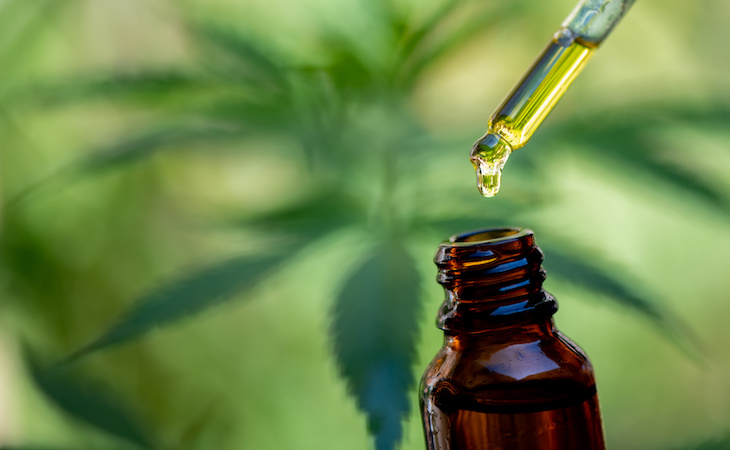As cannabis (marijuana) has become more widely legal for recreational and medical use, the plant has been more closely studied.
Scientists studying the cannabis plant and its close cousin hemp have found it contains a number of different variations of its principal chemical, THC (tetrahydrocannabinol).
There’s Delta-9 THC, best known of the plant’s cannabinoids famous for the “high” it produces when ingested or smoked. There are others, including CBD and Delta-8, that offer potential sleep benefits.
One newly trending form of cannabis that should be on your radar is THCV. Below, we’ll explore everything you need to know about THCV and whether it can improve your sleep.
What is THCV?
Discovered in 1973, THCV (Tetrahydrocannabivarin) affects the same receptors in your brain as THC but is only about one-quarter as psychoactive.
Nicknamed “diet weed” because of its ability to suppress appetite, studies show THCV can be useful in reducing stress and anxiety.
THCV is found in both the hemp and marijuana plants. Both are cannabis plants, but hemp legally is defined as a cannabis plant with 0.3 percent or less THC; marijuana is a cannabis plant with more than 0.3 percent THC.
THCV can be derived from both plants. Most sellers, however, obtain their THCV from the hemp plant to avoid anti-marijuana laws.
Like other types of cannabis, THCV is available in a variety of products—including gummies, vape cartridges, tinctures, and flower. Gummies are by far the most popular as they offer measured dosages, unlike vapes and flower for smoking.
THCV is legal in 38 states under the 2018 federal Farm Bill that legalized all hemp derivatives containing equal or less than 0.3 percent Delta-9 THC.
Can THCV help you sleep better?
Kevin Huffman, DO, a bariatric physician, licensed fitness and wellness specialist, and CEO of Elyria, Ohio-based On the Rocks Climbing Gym, says research on THCV’s sleep benefits is only in its infant stages.
“We need more clinical trials to see if it helps insomnia patients maintain sleep and wake up feeling refreshed and what doses and THCV strains are most effective,” Huffman says. “So far, the early research is promising; any insomniac who wants a natural alternative should keep an eye on future research.”
Huffman explains that THCV may affect sleep by interacting with receptors in the endocannabinoid system, leading to the release of neurotransmitters such as melatonin, serotonin, and cortisol which can promote relaxation and affect sleep.
It also seems to help relieve anxiety, which can make a big difference in falling and staying asleep.
We need more clinical trials to see if it helps insomnia patients maintain sleep and wake up feeling refreshed, and what doses and THCV strains are most effective. So far, the early research is promising; any insomniac who wants a natural alternative should keep an eye on future research.
Kevin Huffman, DO, a bariatric physician, licensed fitness and wellness specialist
Against what we might expect, however, THCV produces a mildly stimulating effect. At first glance, that would seem to counteract sleep.
But Huffman says it may be that THCV actually helps keep the body’s internal clock on track, allowing fewer nighttime awakenings.
He says its appetite-suppressing effects also could benefit people whose sleep is disrupted by hunger pangs during the night.
How do you use THCV for sleep?
Here are some tips for incorporating THCV into your routine for sleep:
- As with Delta-9 THC (marijuana), the strain of THCV you choose matters. For maximum sleep benefits, it’s best to choose an indica or indica-dominant hybrid. Each strain of hemp and its cannabis cousin has a distinctive terpene profile, with some terpenes providing a more mellowing effect than others.
- THCV comes in a variety of forms. Gummies, capsules, tinctures, and vapes are most popular for sleep.
- As with other medications, it’s advisable to “start low and go slow” with THCV dosing. For minor insomnia or low tolerance, 5-10 mg is suggested. For intermediate insomnia or medium tolerance, 15-20 mg. For severe insomnia or high tolerance, 25+ mg is suggested.
- It’s suggested that taking THCV 30 minutes before bedtime is most effective.
- For anyone interested in trying THCV to help with sleep, Huffman recommends consulting a medical professional first. “Tell him or her about your medications so you fully understand the risk of using this medicine,” he says.
FAQs
Can you take THCV at night?
Yes, if you’re going to take THCV for sleep it’s best to take it 30 minutes before bedtime.
What is the benefit of THCV?
Research suggests that THCV has several benefits, including appetite suppression that can help in losing and controlling weight, reduced anxiety and stress, increased alertness and energy, and improved sleep.
Is THCV good for anxiety?
THCV seems to provide anxiolytic effects, which can be helpful if anxiety or stress are interfering with your sleep. While many people use THC to help manage anxiety, it can produce paranoia instead.
THCV may offer the same mental health benefits but without the risk of paranoia. It can be useful in dealing with post-traumatic stress disorder (PTSD), obsessive-compulsive disorder, and other anxiety disorders.
Next, learn about the most common natural sleep aids on the market and their pros and cons.




